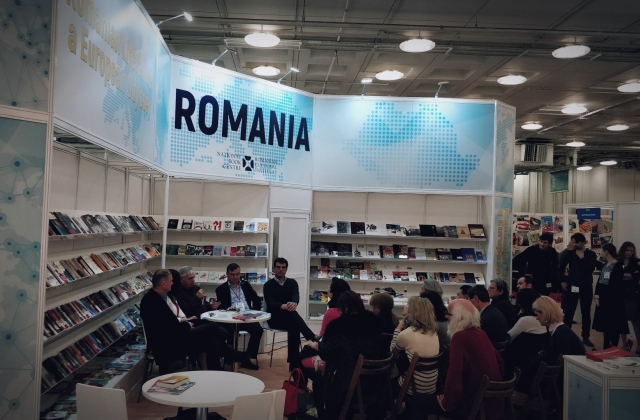Romania at the Paris and London book fairs
Romanian literature was well represented in the most important book fairs held this month

Bogdan Matei, 18.03.2019, 13:44
Romanian
literature as part of the wider family of European literature was the topic of
a debate held on the first day of the London Book Fair held over March 12-14.
Special guests were European Union Literature Prize recipients Ioana Parvulescu
and Claudiu Florian. The attendance included translators, writers, journalists,
academia, British officials and readers passionate about Romanian literature.
Romanian-born American writer Andrei Codrescu was the protagonist of another
event, the launch of his latest poetry volume, No Time Like Now. It was in
fact a recital of poetry and music, with poetry readings intertwined with
pieces performed by pianist Mina Beldimanescu.
Romania’s participation in the
London Book Fair has become a landmark, not just for Romanian culture
consumers, but intellectuals interested in European culture in general.
Evidence of that were the speeches of our British partners, literary critic
Razvan Voncu said, himself a participant in the London Book Fair. Romania was
well represented in the Paris Book Fair as well, held over March 15-18, bringing
together 1,200 publishers, 35,000 authors from nearly 100 countries and
totaling some 180,000 guests. The last edition slightly broke with the
tradition of having one country as guest of honor to celebrate, instead, for
the first time in the history of the fair, Europe as a whole. 35 Romanian
publishers took part in the fair.
The Romanian Cultural Institute played host
to debates and book launches under the slogan 2019 – The Year of Romania in
Europe. The excellent relations between Romania and France and Romania and
Europe as a whole was the topic of a debate titled 30 years after Returning to
Europe, devoted to the three decades free of communism. Another successful
event hosted by Romania’s pavilion featured traveller and storyteller Estelle Cantala,
who told the audience about her experience collecting folk tales in Maramures,
Northwestern Romania. A round table was devoted to Panait Istrati, whose works
in French are internationally acclaimed. An overt leftist advocate, Istrati
travelled extensively to the Soviet Union accompanied by communist officials,
which earned him the nickname Maxim Gorki of the Balkans. Istrati visited the
USSR in the first years of Stalin’s dictatorship and became one of the first
intellectuals to condemn the horrors of the Soviet regime. EU Commissioner for
Economic and Financial Affairs, Pierre Moscovici, himself the son of a
Romanian-born psychologist, visited the fair and held a press conference,
reiterating the EU’s support for publishers and literature in general.






























